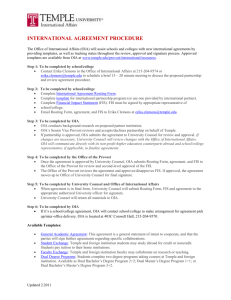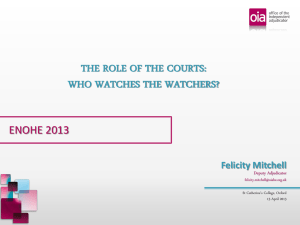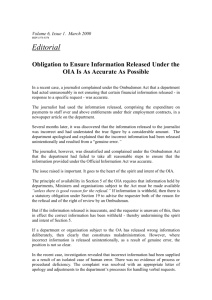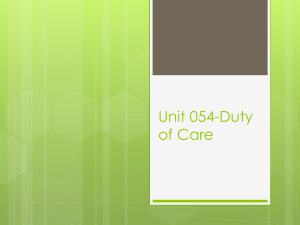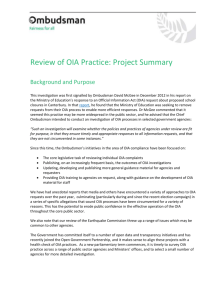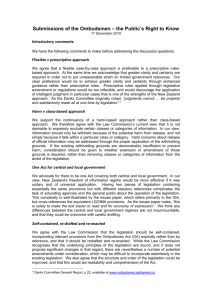Robert Behrens` Presentation
advertisement
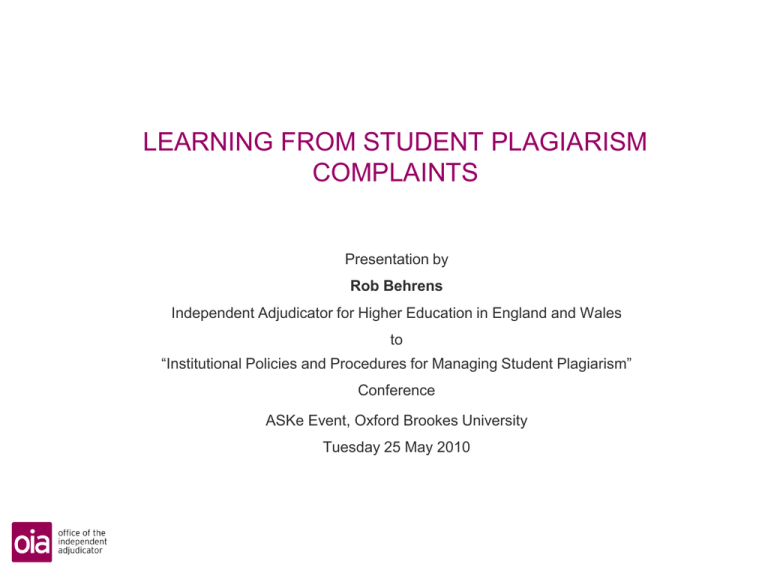
LEARNING FROM STUDENT PLAGIARISM COMPLAINTS Presentation by Rob Behrens Independent Adjudicator for Higher Education in England and Wales to “Institutional Policies and Procedures for Managing Student Plagiarism” Conference ASKe Event, Oxford Brookes University Tuesday 25 May 2010 OVERVIEW • Re-visiting the OIA Mandate and Operations Eligible Complaints by Year Outcome of Eligible Complaints 2009 Complaints by Financial Status Justified and Partly Justified by Category • Evidence from the Pathway Report • The OIA’s Approach to Plagiarism • The Offence • Procedural Fairness and Penalties • Individual Circumstances • Preventive Action -Towards Good Practice 1 REVISITING THE OIA MANDATE AND OPERATIONS • National Adjudication Scheme under 2004 Act has counterparts in Austria and Sweden. • All universities in England and Wales required to join Scheme and comply with Rules. • Scheme free to students. • Dual test of whether university has abided by its own procedures and/or has acted reasonably “in all the circumstances”. • Significant differences to Scottish Scheme in terms of access and transparency • Complaints must not relate to “Academic Judgment” (ie ‘what is plagiarism?’ in any given case), employment issues or matters before a Court. • Subject to Judicial Review (25 cases since 2007). • Received 3500 complaints and made 3000 decisions since inception. • Two-thirds of complaints relate to academic appeals, exam results and degree level. • 39 per cent of complaints come from postgraduates, 22 per cent from international students outside EU. 2 ELIGIBLE COMPLAINTS BY YEAR Source: OIA Annual Report 2009 3 OUTCOME OF ELIGIBLE COMPLAINTS 2009 Source: OIA Annual Report 2009 4 COMPLAINTS BY FINANCIAL STATUS Source: OIA Annual Report 2009 5 JUSTIFIED AND PARTLY JUSTIFIED BY CATEGORY Source: OIA Annual Report 2009 6 EVIDENCE FROM THE PATHWAY REPORT (1) • Pathway Consultation launched in October 2008. • Sample of 776 complainants used with response rate of 38 per cent. • 125 submissions to Issues and Questions Paper from universities, students’ unions, interested citizens and key stakeholders. • Survey returns broadly representative of students using OIA services. • Report published on February 11 2010 with Launch at Institute for Government, London. • Submissions and quantitative survey were published on new OIA website on 31 March 2010. • • Meetings with Vice Chancellors, Presidents of students’ unions and other Stakeholders on campus throughout the consultation. Quantitative study of OIA Complainants conducted by researchers at King’s College, London from 1 December 2008 to 30 June 2009. 7 EVIDENCE FROM THE PATHWAY REPORT (2) Universities and students’ unions • Widespread agreement amongst universities and students’ unions that mandate is appropriate, Scheme is Independent, Decisions are consistent and that Scheme has improved university practice. Complainants • 64 per cent of complainants thought that university handling time was too slow. • 79 per cent of complainants believed they had not had a fair hearing. • 81 per cent felt unsupported during proceedings. • 60 per cent of complainants believed their issue was not taken seriously by university. • 58 per cent discovered university documents through the OIA process they had not previously seen. • 48 per cent had not been kept informed during the course of their complaint. • 39 per cent of complainants not confident that OIA Recommendations would be implemented by the university. 8 EVIDENCE FROM THE PATHWAY REPORT (3) Source: The Pathway Report 9 THE OIA’S APPROACH TO PLAGIARISM • OIA normally involved following action taken by university against student under its Academic Misconduct regulations. • Has university applied Rule 7.3 (followed procedures/been reasonable) ? This usually means concerns with procedural fairness not substantive merits of the evidence. • Whether a student has exhibited plagiarism (and how much) are matters of Academic Judgment. • But will be concerned if key evidence is not considered. • Complaints to OIA are usually one or more of: Technical issues concerning the offence (e.g. definition, burden of proof, strict liability); Procedural unfairness in dealing with the allegation (including delay); Unfair penalties; Failing to take account of the student’s individual circumstances. 10 THE OFFENCE • Definition Need for clarity of definition in circumstances of: (e.g.) memorising text book passages for exam; prosecuting under wrong offence; ‘autoplagiarism’. • Burden/Standard of Proof Regulations often vague here. Burden of proof lies with university, not with the student. OIA does not insist burden of proof must be ‘beyond reasonable doubt’. • Strict Liability At many HEIs, whether the student intended to plagiarise is irrelevant. But where intention is required, the evidence must be reviewed. PROCEDURAL FAIRNESS AND PENALTIES • Universities should ensure students are aware of the charge; that both parties are heard and have the opportunity to hear what the other side says about them. • There should be reasonable notice of a hearing and advance access to information to be considered by the panel. • Legal test is Porter v Magill (2001 UKHL 67). • Penalties: 2006 Baroness Deech commented on the inconsistent range of variable penalties; JISC research AMBeR NLearning points scoring system taken into consideration a range of factors. OIA does not consider penalty level a matter of Academic Judgment. But normally will not criticise an imposed penalty unless the Penalty was(e.g.): Disproportionate to offence; Seriously out of line with sector; Inconsistent with other departments within university; Student treated differently to other students within university; Imposed by Officer or body exceeding powers; Given notwithstanding incorrect advice given to student on consequences. 12 INDIVIDUAL CIRCUMSTANCES • Students may claim that, although they accepted they plagiarised, they had mitigating circumstances e.g. suffering from stress or that they had family problems. • Usually university regulations do not allow consideration of mitigating circumstances in these cases when determining whether or not the offence was committed. • OIA position is that this is acceptable unless the regulations allow for it. • However, mitigating circumstances are likely to be relevant in relation to penalties. • Situation is different where there are mental health or other disability issues. (e.g. student claim that plagiarism arose from “obsessive compulsive disorder”). 13 PREVENTIVE ACTION Necessary preventive action arises from: Quantitative finding in Pathway Report that 60 per cent of complainants reported that it was ‘quite difficult’ ‘very difficult’ or ‘impossible’ (8 per cent) to find out about the procedures to follow; Cross-cultural experiences of newly enrolled students coming from different countries, different schools, different labour markets; requires pro-active, educative strategies to level the playing field; Evidence that university staff are not immune from instances of plagiarism so assumptions cannot be easily made about what is known and who knows it. 14
